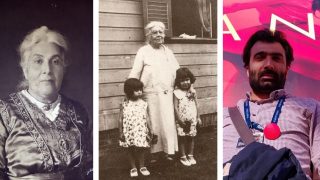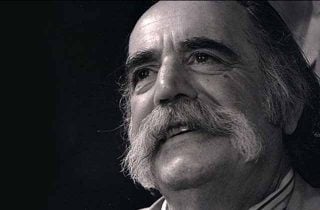Flights in Reality
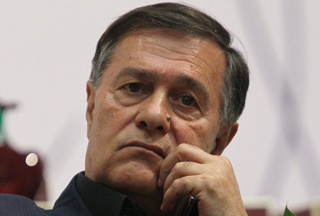
“Nerkin Horatagh village of Martakert region of Nagorno-Karabakh” and “O.Dovzhenko Film Studio in Kiev” expressions seem incompatible. However, the reality is, birth and working places of Armenians, who succeed in their profession, are ten thousand kilometers away from one another.
Like in case of film director Roman Balayan (“Guard me, my talisman”, “Flights in dreams and in realty,” “The spy” (Filyor) and etc). It’s clear that he didn’t shoot any film in Armenia, as here he hasn’t even been considered for a job. However, nostalgia for his homeland made him frequently visit his friends and relatives Armenia, Artsakh, where Roman Balayan’s brother was living with his family. Just recently the Master was in Armenia; interview with him was quite accidental, just on the spot, hours before Yerevan-Kiev flight, so quickly, that it’s hard for me to understand it was in dream or in realty..?
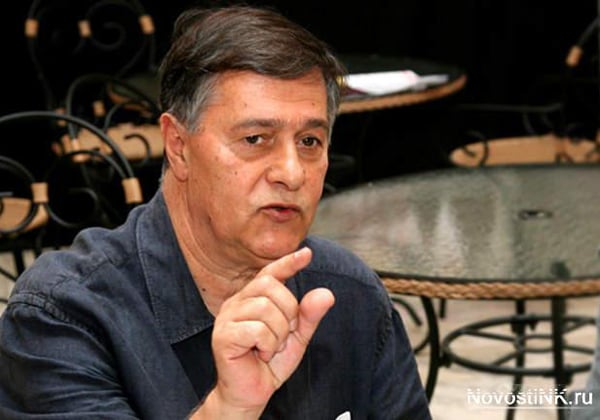
–As a rule, Armenians succeed when they leave Armenia. You also weren’t considered for a job in “Hayfilm”…
-While studying at Yerevan State Institute of Theater and Cinematography, I was in good ties with Yervand Kochar (I was his favorite). When I moved to study in Kiev and was back to Yerevan six months later, he asked, “Romik where are you? I can’t find you.” I said I left Armenia and I was studying in Kiev then. “Huh, unfortunately an Armenian reaches success beyond Armenia.” After leaving the institute in Kiev, I tried to get a job in “Hayfilm.” They didn’t take me.
For over two years I was trying to… later on, with difficulties, I was taken to Dovzhenko Film Studio in Kiev. “You’re lucky not to be recruited in “Hayfilm,” you wouldn’t shoot any film,” one of my friends joked. Likewise conversations are surprising to me. As an Armenian, I regret to hear this.
–Do you have answer to this? Why is it so?
-The reason is, there is no job here. People left Armenia before as well. Everybody knows this. Historically it turned this way. I’m of the opinion, that (many are offended for this view), that Armenians are emigrants and wanderers. And those, who are needy, leave the country. What does Armenia lack? I didn’t understand why they strived to leave the country. Now they leave because of poverty, unemployment. Lack of spiritual atmosphere…
– Poverty? …But you weren’t poor when you left. Many people leave for that very reason, and the reason for you was the very little possibility of expressing yourself, as well as unequal conditions.
– I don’t deny—this is a very fundamental reason. Until now, however, I don’t have an answer to the question: Why do Armenians more often succeed, when they are out of the borders of their country?
–Armenians abroad usually unite, to help each other, create new chances for one another. Interesting enough, in your films, however, you didn’t include Armenian actors. Even Armen Dzhigarkhanyan…
–There are lots of artists, who’d like to act in my movies. For instance, in “Flight in dreams and in reality” my friend, a perfect film director Nikita Mikhalkov was to appear in the film. The script has already been written for him, however, the ready script turned out somewhat light-minded stranger, which was not mine. Despite it was a great script. I was about to refuse it, when suddenly I watched a fragment in “We, the undersigned” movie. A group of friends sitting, among whom—Oleg Yankovski.
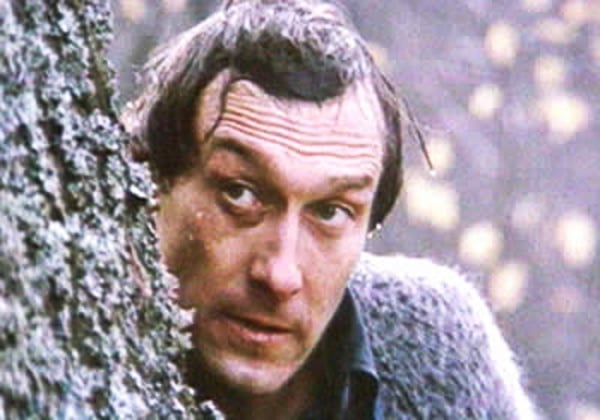
It was rather strange to see that episode, I had feeling that Oleg was both with and without them. And his “absence-presence” caught me very much, and I immediately thought: a hero writes a letter to his mother, however, he doesn’t finish it, he wrinkles the paper. And the paper, like a living creature, starts to flatten and smoothen. At the same time another scene appeared to my mind, his wife enters the kitchen in the morning and ironically asks, “Did you again fly to you mom?” From that moment I understood that I should paint. My wife was happier than ever, as I hadn’t painted for 5 years. And this meant there was no money to live on. I explained to Nikita, why it was necessary to change him. And, of course, he wasn’t offended.
He said, “Old man, I understand you. I’m not only an actor, but a director as well.” Nikita was too stout for that role, as it’s said, fit to this life. And I wanted him to appear as not feeling comfortable with life.
Both Oleg’s face and his organics completely served that purpose. As for Armen Dzhigarkhanyan, there were no proper characters in my movies for him, accordingly, we didn’t have the chance to work together.
– How about Frunzik Mkrtchyan?
– Frunzik Mkrtchyan, Sos Sargsyan have always been interesting to me. As for Frunzik Mkrtchyan, I didn’t shoot comedies. My characters were quite different. I was always interested in destiny of intellectuals. “Guard me, my talisman”, “Flights in dreams and in realty,” “The spy” (Filyor)—these are films about Russian and Soviet intellectuals. And not only about them…
– Once you noticed that you’ll keep your children apart from cinematography, as your life in it was degrading, there was pressure from the authorities and literary critics.
–The thing is my generation grew under strict literary criticism and pressures over art. And this was quite degrading, “Cut that episode, change the second, the third…” And this was the reason that I did my best that my children weren’t attracted with cinematography. I wouldn’t do so now, they may do what they want. For the first time I brought my children to the studio, when they were 18.
– Under this very censorship you shot your best works, and a bit later, when there was no censorship, you again chose the Soviet period and shot “Birds of Paradise”.
– “Birds of Paradise”…this isn’t my best movie. It was difficult for me to shoot it, as developments of the movie refer to 1981. And when I was shooting, there were modern cars everywhere. I had to narrow the scenes and shoot it close-up, i.e. I lacked environment in this movie, which was catching to me in the previous movies. To be honest, I consider my directing biography was completed by “The spy” (Filyor) in 1988.
When freedom came, my generation didn’t know what to shoot. The thing is, we have grown up under strength of materials, in cages, and repeatedly made attempts to widen the cage. It was feeding our imagination. Of course, I also worked, however, until 1988 I shot films, and after it I simply worked. You know, there is a joke on it: early 90s, Tbilisi. A Georgian meets his friend and asks, “Givi, did you settle down?” Reply, “Not yet, I only work.” Exactly after 1988 it was my case.
–There was no freedom in the Soviet period, however, the artist was trying to create, to get that freedom due to art. Turns out, through the context and allegories the created freedom, which you create for yourself is bigger, than that you have, and you don’t know what to do with it.
–I don’t think that there is real freedom now. Freedom is respecting other person’s freedom. It lacks, there is tolerance. Chekhov says, “Free a slave and he/she will become tolerant.” Many people became like that. However, this doesn’t mean I’m right. By the way, whole literature of Tsarist Russia was based on resistance of materials. That time there was censorship as well. But, surely, not the one during the USSR. Pushkin, Tolstoy, Dostoyevski created their works under censorship.
–Art tries to present a person, to ground and formulate the meaning of life. Did you succeed to understand what is life or did you get along with the reality, that, by the highest standards, it’s impossible to understand ? Or maybe there is even no need…
– Nobody may ever find answer to this question. However, answers should be looked for. Art fights for week, defenseless persons.
My art is about intellectuals, about people, who treat everything with skepticism, and who think they are always right. Any movie, even the most unsuccessful one, is a certain message for a particular number of observers. To the people you want to make an interlocutor, with whom you try to share with something you are bothered and interested in.
Despite its success, it carries a message that not every person will accept. Accordingly, there are movies for everyone, and those—for some of them. Let me say in other way—for intellectuals and for those, striving to become one. Who you can talk to now? Everybody loves American movies, and they already know—they will have a happy ending. I’m not against, they may watch them. In any case it’s about love, betrayal, hatred, deceit. I’d even say they are pop-corn movies.
–“Romeo and Juliette” is also a story of love, loyalty, deceit…
–Shakespeare has 37 or 39 plays and there is everything in them. There was brilliant literature, painting, sculpture in Middle Ages. There was Renaissance, there was remarkable 19th century of Russian literature. Whole 20th century is a transitional period and another phase of life. Again no democracy. Simply power of 30% is on the other 70%. Today is the time for oration, where people should say how everything is bad and terrible. It’s not interesting to me in the movie, as I love everyone.
For instance, every Armenian is a friend to me despite who he/she is. I say this, as our talk takes place in Armenia. I live far from Armenia, however, I’m concerned with the destiny of every Armenian, to the extent, they are concerned here. I share everybody’s concern and rejoice with their success.
– Aren’t you concerned what quality 30% leads the other 70%?
–I can’t say that I’m not content with our times. One intellectual said, “Times aren’t chosen, in that period people are born and die.” You know, presently consciousness of individual responsibility lacks. Surprisingly enough, there is hope on authorities, that they should change something or opposition leaders. I consider, everything depends on everyone. It’s not clear to me. I live with my life. I have never been next to either opposition or authorities. And artist should be free.
They say, in the period of Renaissance kings and Popes were giving orders to Rafael and others. And they say, what great times they were. However, friends, they were painting divine images or portraits of their customers. It was convenient for everyone. Simply what Rafael and other were doing, was implemented with remarkable mastery.
– Is Bible thematic interesting to you?
(See continuation of the interview in the next edition).
By Lilit Avagyan









